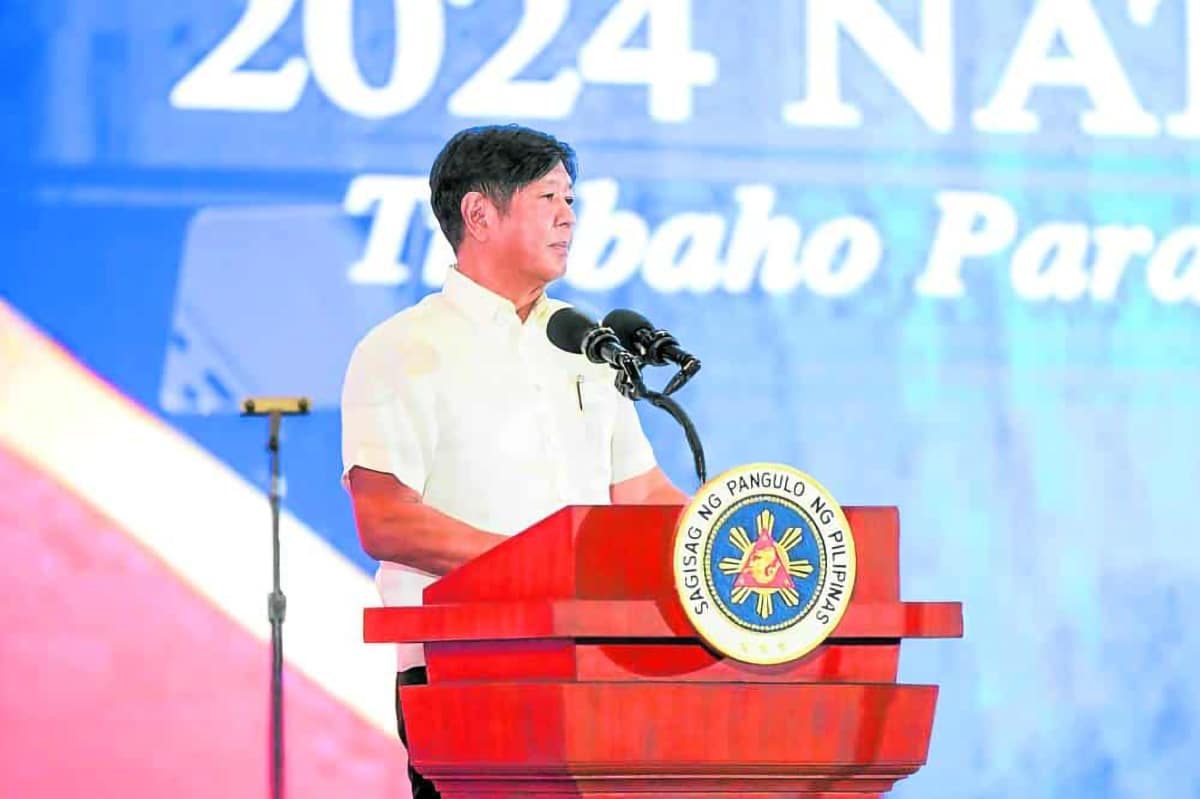
JOBS SUMMIT President Marcos talks about his “Trabaho Para Sa Bayan” (Jobs for the People) program at the Manila Hotel on Thursday. —PRESIDENTIAL COMMUNICATIONS OFFICE
The government will continue to upskill and reskill Filipino workers’ technical expertise to help them keep up with the increasing involvement of artificial intelligence (AI) in the digital economy, President Marcos said on Thursday.
The President made the statement as he expressed optimism that a 10-year national employment roadmap will result in the creation of three million jobs before he steps down in 2028.
Speaking at the 2024 National Employment Summit at the Manila Hotel, the President conceded that new technologies, including AI, “changed the priorities of every economy.”
“The arrival of the digital economy, the expansion of the digital space—actually, it’s already here, we just don’t quite realize it. But the increasing involvement of AI requires technical knowledge, technical training and experience for us to be able to participate in it. And that is the job of the government,” Marcos said.
READ: Tesda offers courses for farmers’ upskilling
He assured the public that the government would bring workers to the “skill levels that are required so we can compete in the job markets” here and other countries.
“Rest assured that this administration will continue to ensure the sustainability of jobs, upskilling and reskilling of our workers to maintain the productivity and the edge of our labor force and our economy,” the President said.
He also expressed optimism that the implementation of the 10-year national employment masterplan under Republic Act No. 11962 or the Trabaho Para sa Bayan (Jobs for the People) or TBP Act will drive employment upwards towards economic recovery.
Thursday’s summit was a venue for key players and stakeholders to formulate the TPB plan to address perennial issues such as job-skills mismatch, underemployment, and unemployment.
‘Driving forces’
“The TPB Plan will be one of the driving forces to help create at least three million new jobs by the year 2028. Beyond generating employment, what we want to achieve is creating quality jobs, with special emphasis on ensuring workers’ welfare, empowerment, competitiveness, and security in all sectors of our labor sector,” he said.
According to the Labor Force Survey released on June 6, labor statistics improved from April 2023 to the same period this year as employment went up from 95.5 percent to 96 percent, with the number of employed Filipinos increasing to 48.46 million from 48.06 million.
Unemployment also slid to 4 percent from 4.5 percent last year, which meant that the number of unemployed persons went down to 2.04 million from 2.26 million.
The President then called on government agencies and labor sector stakeholders to “lay the groundwork that will ensure that the next decade will be a decade of meaningful employment and economic growth.”
“We have exciting times that lie ahead. We look forward to the new jobs, the new sectors, the new opportunities that are waiting for us and for the Philippines … Let us craft a TPB plan with the goal of ensuring that our people are reaching their fullest potential as active participants in building our nations and our world,” he said.
He appealed to the private sector to “work closely with the government to create more quality and green jobs for our workers.”
“May you also take advantage of the incentives and reforms that we have put in place to expand your operations, generate more employment and opportunities for all Filipinos,” the Chief Executive said.